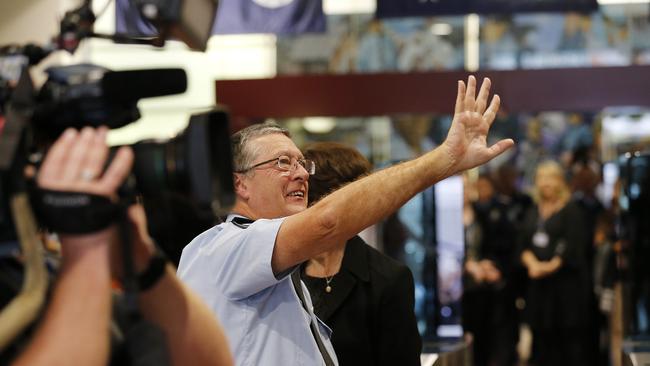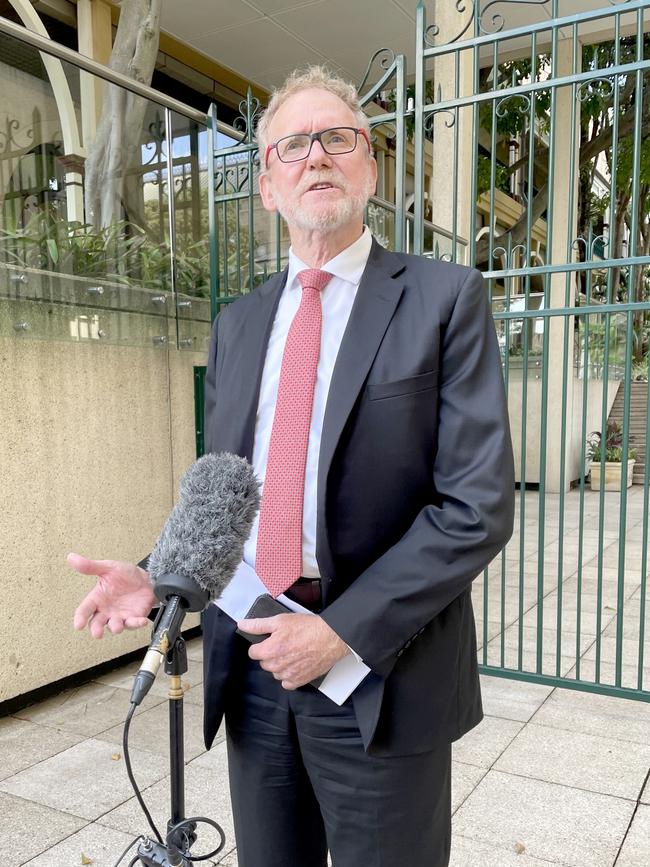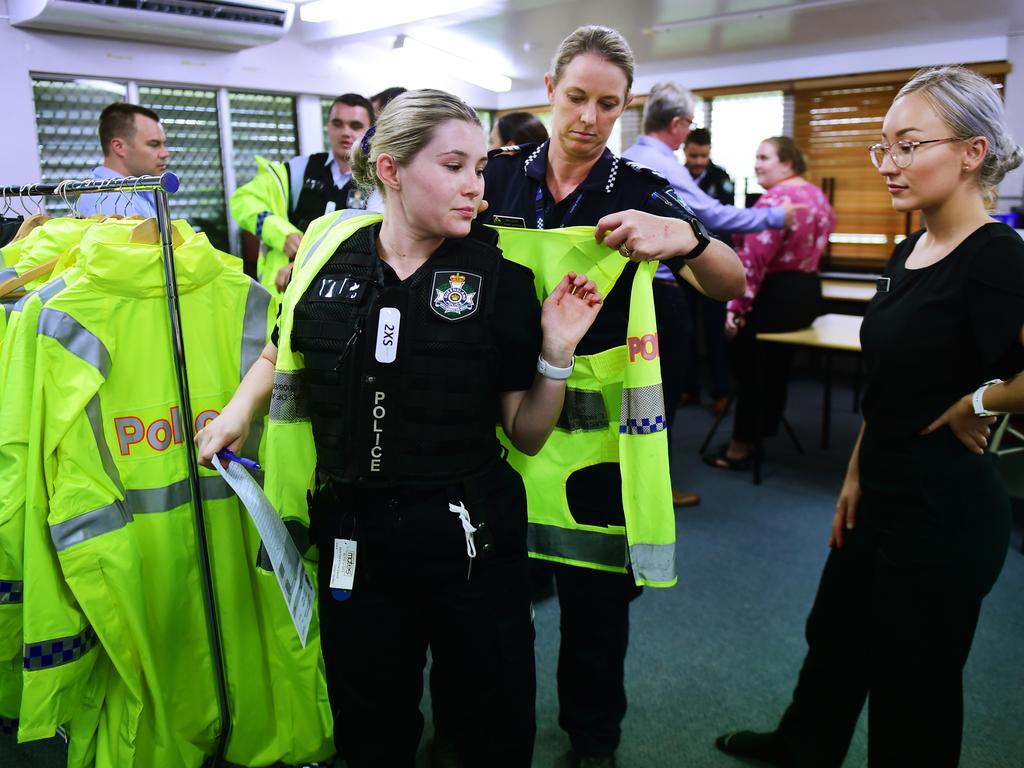CCC gender quota report ‘damaging Queensland Police credibility’
Ex-top cop demands inquiry into Crime and Corruption Commission report slamming ‘discriminatory’ drive for female recruits.

Former Queensland police commissioner Ian Stewart is demanding an immediate inquiry into a Crime and Corruption Commission report that slammed a “discriminatory” drive for women to make up half of all new police recruits.
His call comes after Queensland Human Rights Commissioner Scott McDougall issued an extraordinary public warning in The Weekend Australian that the CCC’s Investigation Arista report “shouldn’t undermine the legitimacy and lawfulness of equal opportunity measures”.
The CCC’s report had found there was “ample evidence” that to achieve a 50-50 gender equity recruitment target — imposed by Mr Stewart in late 2015 — the Queensland Police Service “engaged in discriminatory recruitment practices”.
Around 200 “more meritorious” men had missed out on being recruited as a result, the report stated.
But Mr McDougall said the recruitment of women into policing was critically important.
“Adjusting recruitment techniques to ensure gender diversity, while still testing for genuine occupational requirements is an indication of equitable hiring practice, not discrimination under the law,” he said.
Mr McDougall took issue with comments made by CCC chairman Alan MacSporran while publicly discussing the report this week.

During a media conference held at the CCC’s Brisbane headquarters on Wednesday, Mr MacSporran said Queensland police had failed to apply for an exemption to engage in positive discrimination “so it was unlawful conduct”.
“The CCC report shouldn’t undermine the legitimacy and lawfulness of equal opportunity measures, which are protected by s105 of Queensland’s Anti-Discrimination Act without needing to apply for an exemption,” Mr McDougall said.
“While applying for an exemption may have been desirable, the absence of an application doesn’t necessarily mean that QPS engaged in unlawful discrimination.
“The suggestion by the Chairman of the CCC that the failure to apply for an exemption amounted to unlawful discrimination would therefore appear to be incorrect.”
In a statement subsequently provided to The Australian on Saturday, Mr Stewart accused the CCC of damaging the police service and individual staff.
“I am disappointed that the fundamental premise of the Investigation Arista Report – that of discrimination which Mr MacSporran stated amounted to ‘unlawful conduct’, has been challenged as being erroneous by the independent QHR Commissioner,” Mr Stewart said.
“I am hopeful that this revelation will result in an immediate inquiry by the Parliamentary Crime and Corruption Committee into how the systems of our pre-eminent oversight agency may have made such a mistake.
“The damage to credibility of the entire Qld Police Service and to the reputations of some individuals has been significant, as a result of this report. I trust accountable individuals will address this issue as a matter of priority.
“I continue to strongly believe that the community supports and wants a more diverse and inclusive model of policing. Government policies and the law in Queensland properly considered, supports this vision.”
The Investigation Arista report revealed that to meet a 50-50 gender target for new police recruits, the Queensland Police Service had selected women who had previously failed psychological and physical assessments and standards.
A female inspector and two civilians have been suspended over their implementation of the target, scrapped by current police commissioner Katarina Carroll after she was appointed in 2019..
Mr McDougall said he wanted to clarify how the law operated in relation to equal opportunity and recruitment.
“When recruiting, organisations need to look at the genuine occupational requirements for the roles they’re recruiting for,” he said.
“The QPS themselves state that the attributes important to operational police officers are things like good communication skills, problem solving, compassion, and an ability to defuse situations.
“Adjusting recruitment techniques to ensure gender diversity, while still testing for genuine occupational requirements is an indication of equitable hiring practice, not discrimination under the law.”
He added that the police force needed “to reflect the community they’re policing”.
At the time the 50-50 target was introduced, around three quarters of police officers were men.
Mr McDougall said he had spoken to Ms Carroll about the issue and that the two agencies had committed to work together to increase the diversity of police recruits.
“When we look at issues confronting the QPS at the moment – like domestic violence and safe workplaces for women – increasing the numbers of women in the police force is a critically important strategic and operational requirement,” he said.
A CCC spokesman said on Friday that the agency accepted discrimination could be lawful under the Human Rights Act in some circumstances.
The CCC spokesman’s full statement in response:
“The CCC accepts that under the Human Rights Act discriminatory conduct may be lawful if an exemption is obtained under section 113 or by operation of the Act under section 105. “The CCC’s point in Investigation Arista is that nothing was ever the subject of analysis at the QPS as to whether that was their legal position or otherwise.
“Despite the QPS having an advice obtained by QFES which cautioned about the risks in engaging in discriminatory conduct, there was no evidence obtained during Investigation Arista that the QPS made any attempt to obtain any legal advice or otherwise to explore the lawfulness of their proposed course. That is the context in which the comments were made.
“It is important to note, the recruitment practices of the QPS criticised by the CCC were not applied consistently in the same way to all recruits.
“Different approaches to different recruits at different stages of recruitment during the period in question demonstrates the QPS did not have an overarching consistent policy to achieve gender equity or to consciously meet the requirements of section 105.
“It is not the CCC’s role to determine if section 105 applied to the actions of the QPS referred to in the Arista report, or whether the QPS should have applied for an exemption under section 113. That was a matter for the QPS, and the evidence gathered during Investigation Arista indicated they never considered it.
“The CCC is entirely supportive of properly considered and evidence-based policies which have as their objective achieving gender equity in the workplace, and the Arista report should not be construed as any deterrent in striving to achieve this outcome.”





To join the conversation, please log in. Don't have an account? Register
Join the conversation, you are commenting as Logout